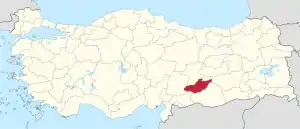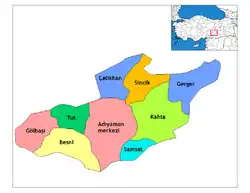Adıyaman Province
Adıyaman Province (Turkish: Adıyaman ili, Kurdish: Parêzgeha Semsûrê[2]) is a province in south-central Turkey. It was created in 1954 out of part of Malatya Province.[3] It has an area of 7,606.16 km² and a population of 590,935 (2010 est.), up from 513,131 in 1990. The capital is Adıyaman. The province is considered part of Turkish Kurdistan and has a Kurdish majority.[4][5]
Adıyaman Province
Adıyaman ili | |
|---|---|
 Location of Adıyaman Province in Turkey | |
| Country | Turkey |
| Region | Southeast Anatolia |
| Subregion | Gaziantep |
| Government | |
| • Electoral district | Adıyaman |
| • Governor | Mahmut Çuhadar |
| Area | |
| • Total | 7,606.16 km2 (2,936.75 sq mi) |
| Population (2018)[1] | |
| • Total | 624,513 |
| • Density | 82/km2 (210/sq mi) |
| Area code(s) | 0416 |
| Vehicle registration | 02 |

Adıyaman Province was part of the province of Malatya until 1954. It was made into a province on 1 December 1954, as a reward for voting for the winning Democratic Party in the 1954 general election.[6]
Demographics
The area was part of Mamuret-ul-Aziz Vilayet during the Ottoman era as Behisni, Hasanmansur and Kahta districts. These three districts had a total population of 99,439 in 1914 of which 93.4% was Muslim and 6.6% Christian.[7]
The province had a population of 208,755 in 1955 of which 99.8% adhered to Islam and 0.2% to Christianity.[8] In 1960, the province had a population of 233,717 of which 99.7% was Muslim and 0.3% Christian.[9] In 1965, the population increased to 267,277 of which 99.8% was Muslim and 0.2% Christian.[10]
The majority of the population is Hanafi Kurdish,[4][11] with a significant Alevi Kurdish population.[12] One estimate from 2014 places the Alevi population at 11%.[13] The province is generally more pious than other Kurdish areas in Turkey[14] and has been a hotspot for radicalization and Islamism in recent years (see Dokumacılar).[5][15] Historian Şahidin Şimşek argued that Hanafi adherents in the province had been manipulated by the state to believe that Kurdish nationalism equated to Alevism. Another theory points at the poverty in the province.[16]
The western districts of Besni, Gölbaşı and Tut are populated by both Kurds and Turkmens.[17]
Districts
Adıyaman Province is divided into nine districts:
See also
Notes
- Turkish state (2014), Aşiretler Raporu (in Turkish) (3 ed.), Kaynak Yayınları, ISBN 978-975-343-220-7
References
- "Population of provinces by years - 2000-2018". Turkish Statistical Institute. Retrieved 9 March 2019.
- "Parêzgeha Semsûrê çûn û hatina bajêr qedexe kir". Peyama Kurd (in Kurdish). 2 April 2020. Retrieved 27 April 2020.
- "The Heritage of the Kingdom of Commagene - Adıyaman".
- "Kurds, Kurdistān". Encyclopaedia of Islam (2 ed.). BRILL. 2002. ISBN 9789004161214.
- "Divided loyalties as Kurds hold key to Turkish election". Reuters. 4 June 2015. Retrieved 17 September 2015.
- "Adıyaman Tarihi" (in Turkish). Retrieved 8 December 2020.
- Karpat, Kemal (1982). Ottoman population 1830-1914. The University of Wisconsin Press. p. 146. ISBN 9780299091606.
- Dündar, Fuat (2000), Türkiye nüfus sayımlarında azınlıklar (in Turkish), p. 202, ISBN 9789758086771
- Dündar, Fuat (2000), Türkiye nüfus sayımlarında azınlıklar (in Turkish), p. 211, ISBN 9789758086771
- Dündar, Fuat (2000), Türkiye nüfus sayımlarında azınlıklar (in Turkish), p. 222, ISBN 9789758086771
- Turkish state (2014), pp. 13-35.
- Yalçın, Kemal (2004). Sari gyalin. Birzamanlar Yayincilik. p. 157. ISBN 9789756158050.
- Rençber, Fevzi (2014). "Adıyaman Alevilerinin Coğrafi Dağılımları ve Demografik Yapısı". Mezhep Araştırmaları (in Turkish): 15.
- Pamuk, Humeyra (15 October 2015). "Small Turkish town haunted by lost sons, hand of Islamic State".
- Yavuz, M. Hakan; Ali Özcan, Nihat (2015). "Turkish Democracy and the Kurdish Question". Middle East Policy. 22 (4). doi:10.1111/mepo.12159.
- Bozarslan, Murat (23 July 2015). "The Islamic State's secret recruiting ground in Turkey". Al-Monitor. Retrieved 8 January 2020.
- "Adıyaman Alevilerine kısa bir bakış". Alevi Net (in Turkish). 16 March 2017.
External links
 Media related to Adıyaman Province at Wikimedia Commons
Media related to Adıyaman Province at Wikimedia Commons